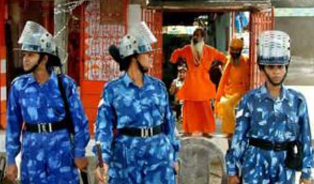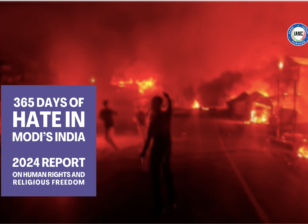India must face up to Hindu terrorism
India’s anti-minorities bias is so strong that it has failed to acknowledge the threat posed by Hindu radicalism

The Indian state’s pro-Hindu stance has left it unwilling to tackle Hindu extremism. Photograph: Str/AFP/Getty Images
or far too long, the enduring response of the Indian establishment to Hindu nationalists has rarely surpassed mild scorn. Their organised violent eruptions across the country – slaughtering Muslims and Christians, destroying their places of worship, cutting open pregnant wombs – never seemed sufficient enough to the state to cast them as a meaningful threat to India’s national security.
But the recently leaked confession of a repentant Hindu priest, Swami Aseemanand, confirms what India’s security establishment should have uncovered: a series of blasts between 2006 and 2008 were carried out by Hindu outfits. The attacks targeted a predominantly Muslim town and places of Muslim worship elsewhere. Their victims were primarily Muslim. Yet the reflexive reaction of the police was to round up young Muslim men, torture them, extract confessions and declare the cases solved.
Pundits now conduct cautious enquiries on television. Does this revelation mean India is now under attack by “Hindu terrorism”? But to treat this as a new phenomenon is to overlook the bulky corpus of terrorist violence in India that has its roots in explicitly Hindu-political grievances. Why is the attack on a Jewish centre in Mumbai by Pakistani gunmen an example of “Islamic terrorism”, but the slaughter of a thousand Muslims by sword-wielding Hindus in Gujarat in 2002 not proof of “Hindu terrorism”, particularly when the purpose of the violence was to establish an Hindu state in India? How do we describe attacks on churches, the kidnappings of pastors, the burning to death of a missionary? What do we make of the war-cry pehle kasai, phir isai: first the butchers (Muslims), then the Christians? What has prompted this debate over “Hindu terrorism” is not Aseemanand’s confession: it is the fact that, in carrying out their violence, his accomplices appropriated methods which, in popular imagination, have become associated exclusively with Islamic terrorism. Detonating bombs in crowded areas: isn’t that what Muslims do?
It is when you look at the reactions to non-Hindu extremism that you absorb how strongly majoritarian assumptions inform the state and society’s conduct in India. In 2002, the Indian government banned the radical Muslim group Simi (Students’ Islamic Movement of India) citing the group’s charter, which seeks to establish sharia rule in India, and the terror charges some of its members were facing. But the Hindu radical outfit RSS (Rashtriya Swayamsevak Sangh or the National Volunteer Corps) remains open for business – even though it campaigns, very openly, for a Hindu state in India, and its members incite and perpetrate violence against Muslim and Christian minorities. Mahatma Gandhi’s assassin was a member of the RSS, as are Aseemanand and his confreres. To get an idea of which of the two groups poses a more immediate threat to India, consider this: the government that banned Simi was headed by the BJP, the political wing of the RSS.
The principal cause of Hindu radicalism, much like its Muslim counterpart in Pakistan, is the partition of India in 1947. The departing British hacked India apart to accommodate the Muslim League’s demand for an exclusive homeland for the subcontinent’s Muslims – and so, the Hindu nationalist logic runs, the territory that remained should logically be identified as the land of Hindus. If Pakistan’s Muslim majoritarianism crystallised around the bogey of “Hindu raj”, the Hindu nationalist project thrives by casting the burden of partition on India’s Muslim minorities – fifth columnists whose coreligionists tore India apart by claiming, in spite of a millennium-long sojourn in India, to be foreigners by virtue of their faith.
For all the saffron calumny, it is impossible to find a community more emphatically committed to India than its Muslims. India’s Hindus never had to make a choice. The Muslims did. Consider what an ordinary Muslim family in 1947 would have had to deal with: terrified by the violence that the partition had unleashed, their coreligionists were fleeing in the millions to Pakistan; Hindu and Sikh fanatics were actively seeking out Muslims for slaughter and rape; the possibility of being betrayed by neighbours and friends was far from remote. Sardar Patel, the second most powerful functionary in the Indian government, was openly hostile to Muslims – hostility which no doubt would have been seen by many Hindus as tacit endorsement of their actions. Amidst all this, the sole authoritative source of reassurance would have been the distant pledges of a better tomorrow by Jawaharlal Nehru. The Muslims who remained, who refused to vacate the hell that was India despite the blandishments of paradise next door in Pakistan, affirmed their faith in India with their lives.
After all this, it is staggering that the Hindu right gets away so easily by routinely humiliating Indian Muslims. From demographics to diet, personal laws to places of worship, Muslims are suspect in everything they do. Adding a dash of foreign authority, glamour and fuel to this unbridled bigotry is the lavatorial “scholarship” of frustrated European converts to Hinduism such as François Gautier and Koenraad Elst. Misfits in their own societies, they have flourished by exploiting communal tensions in a miserably poor country. What the Muslims did to Hindus was worse than the Jewish Holocaust explains one, while the other warns Hindus that they are being outbred by Muslims. The JNU historian Tanika Sarkar was perhaps right in identifying “penis envy and anxiety about emasculation” among the principal reasons for anti-Muslim bigotry.
The Indian state has failed appallingly in its obligations to Muslim citizens. There are 150 million Muslims in India, but as the government’s own figures show, only 4% are graduates, 5% have public employment, an overwhelming majority remain locked out of public institutions, and their access to government loans and education is severely restricted. If this institutional exclusion should breed resentment, and the resentment produce violence, no one will hesitate to call it another instance of Islamic terrorism. But when self-pitying Hindus massacre minorities and detonate bombs in the midst of Muslim crowds, we are expected to be polite. No, let us call it what it actually is: Hindu terrorism.
Reference:
https://www.theguardian.com/commentisfree/belief/2011/jan/19/india-hindu-terrorism-threat




